Corey McKernan says AFL players stuck in ‘horrible online world’ filled with hate
Former Roo and Blue Corey McKernan says AFL players’ pay packets don’t make them immune to the “horrible online world” they’re forced to play in and the “hateful” comments constantly thrown at them.
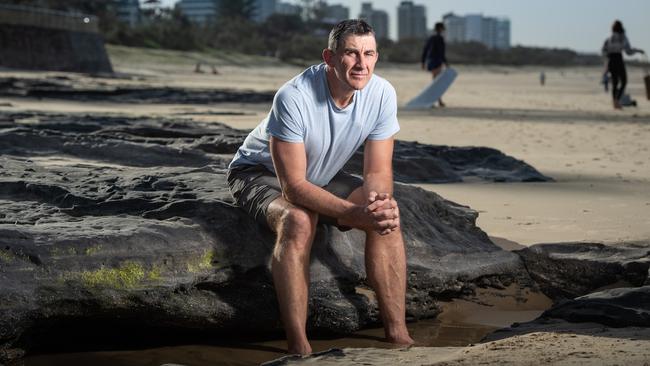
Corey McKernan is a two-time premiership player with the North Melbourne Kangaroos. He would have won jointly the 1996 Brownlow if he hadn’t been suspended. He did all this even though he never wanted to play football. But he did, for 12 years. In the middle of it, he found himself incredibly unhappy and thinking unthinkable things. Fifteen years on from retirement, he has found want he really wants to do — help people who need it. We spoke about falling into football, Brownlow night, dark times, and coming into the light.
HM: When you were growing up in Melbourne, how often was Denis Pagan on the
doorstep of your house?
CM: Quite a lot, actually! I’d stopped playing football when I was 13 years old, and I was playing golf a lot. Then, at the back end of my time at school, I started playing school football, but golf was really my love. I played football because I sort of fell into it.
HM: You were in North Melbourne’s zone?
CM: Exactly, and at our school games, you’d often see Greg Miller, or Rohan Robertson
from the Roos, scouting. It was upon Greg and Rohan’s recommendation that Denis
have a word to me. That was at the start of 1991, but I didn’t want a bar of it! I
remember Denis used to drive out to my house, get to our driveway in Gladstone
Park, and I’d go and hide in my bedroom and get Mum to tell him I wasn’t there!
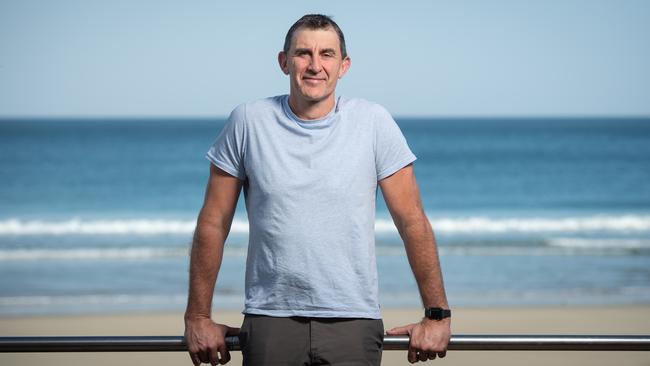
HM: How did he get to you in the end?
CM: It got to round 6 or 7 in 1991, and Denis managed to get me on the landline one
night. He said, “Look, son — you don’t have to train on Tuesday nights, just come
down and train Thursday nights and play Saturdays.” I agreed. Glenn Archer tells a
similar story as he was trying to get me and Arch down to North in the one year.
HM: You had a big debut!
CM: We were playing St Kilda at Arden Street, and it was my first game for the under 19s,
who Denis was coaching. I kicked five goals in the first quarter and finished with 11.
That was the end of my golfing career!
HM: Were you off scratch?
CM: Back then, golf was under the old handicap system. It was very rare that anyone in
the state of Victoria played off scratch. My lowest handicap I got down to was three,
which would be like playing off scratch these days.
HM: The North Melbourne U/19 team was something else.
CM: It ended up being the building block for the 1996 Premiership side. Wayne Carey, Glenn Archer, Anthony Stevens, Wayne Schwass, Stuart Anderson, Anthony Rock — we all had that grounding under Denis in the under 19s. In today’s day and age though, Hame, I don’t know how they would cope with Denis being so straight down the line. Like Wayne Carey said, he may have broken some players, but he made a lot more!
HM: So much success at the Kangaroos — two flags — why did you go to the Blues? Did you need to reset?
CM: I got to the point where I needed a bit of a change. In hindsight, I could have stood up to Denis a little bit more and that would have been good for me. I know the guys that had great relationships with Denis. Wayne, Glenn Archer — they’d let Denis know if he was wrong. I should have stood up for myself a little bit more, and that could have potentially changed the relationship. I didn’t, and I just felt jaded, and needed to leave and refresh and get into a new environment.
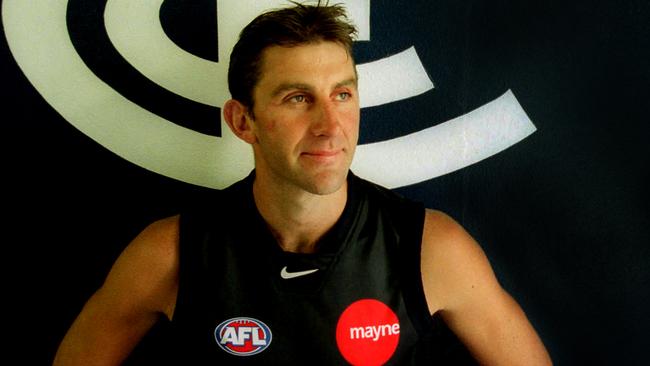
HM: So you went to the Blues to hear a new, fresh voice after so long with one coach.
CM: Only to hear the same voice for half of it! I went to the Blues, played under Wayne Britain, and won the Best and Fairest. Jase McCartney had been winding me up saying that Denis was going to come over to Carlton. After the B&F I went to New Zealand on a holiday. When I came home, I gave my passport to the customs guy, he took a look at my passport, looked at me and said, “You must be happy to be reunited with your old coach!”. That was how I found out that Denis was coming to Carlton. Hindsight’s a wonderful thing. From a mental point of view, it had taken so much out of me that I should have retired then, but I played a year under Denis, then went back
to North for a year, then retired.
HM: You and Denis are close now, aren’t you?
CM: What I love now is that I’ve got a great relationship with Denis. There was a period where it wasn’t good at North Melbourne — where we weren’t getting the best out of one another. But the indelible mark that he’s left on my life in terms of preparation and the way you go about things, that’s what I’m forever grateful for. Life’s too short. Imagine if I had a fractured relationship with Denis? Someone that I’ve won two premierships with. That would just be a disaster. We don’t — we get on really well. He’s a great man.
HM: In 1996, at just 22 years, you managed to put the incredible low of Brownlow night behind you where you tied for first with Voss and Hird, but were ineligible, and went on to have a 29-possession game and become a premiership player five days later?
CM: It’s what I am most proud of in my football career. I’ve analysed that week a lot over the journey. Simon Sinek does a talk on YouTube, talking about the power of having a ‘why’. A cause that will drive you. Looking back at it now, my ‘why’ was wanting to win a premiership medal for Ian Fairley, Dean Laidley, Darren Crocker, Craig Sholl, Anthony Rock — all these guys that had been at North Melbourne for so long without success. It’s never bothered me in the slightest about not winning the Brownlow, but if you do speak to your brother, I would accept one if he was feeling generous …
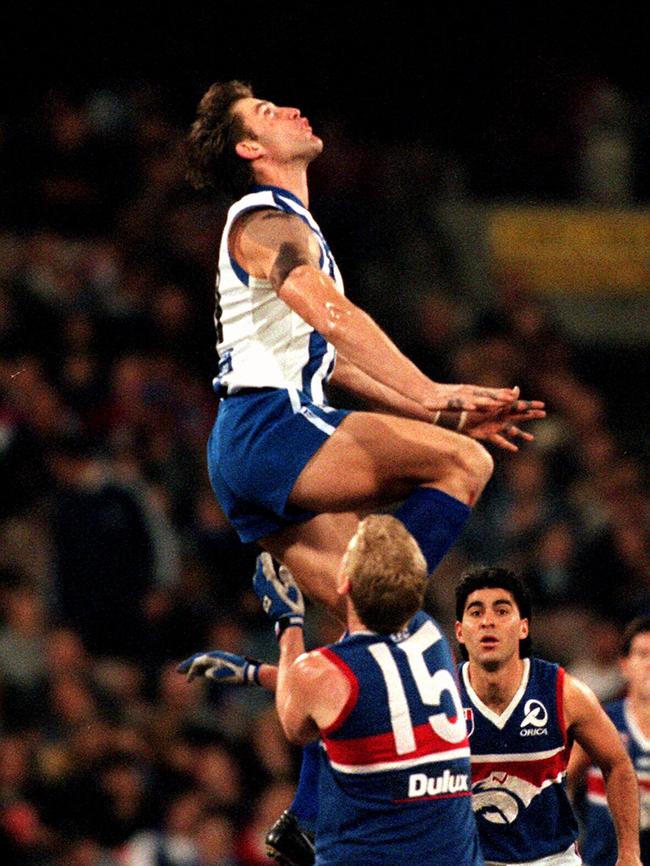
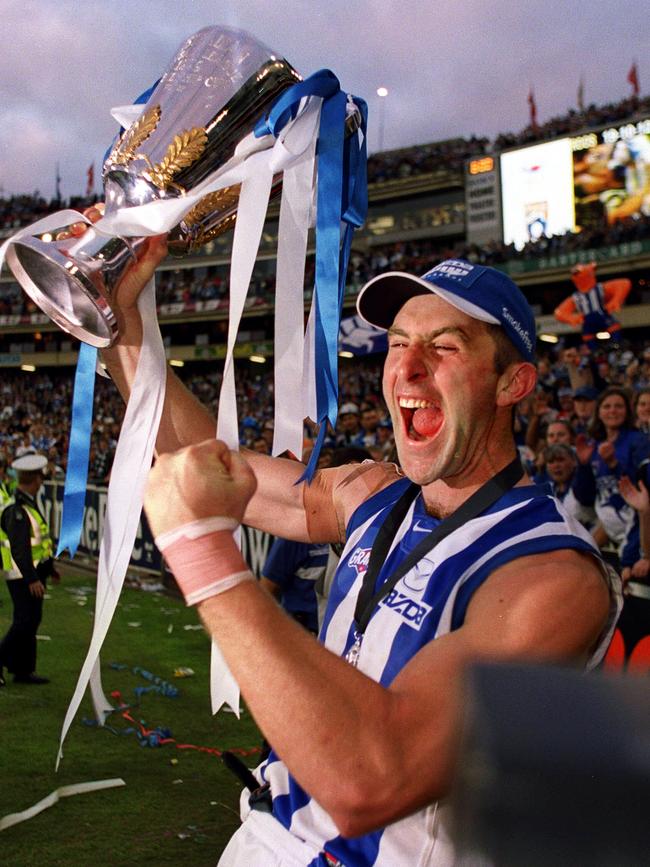
HM: I’ll see what I can do …
CM: I’m prouder of the fact that, as a 22-year-old, I hurt my knee badly in the prelim final. On the Monday, I had the disappointment of the Brownlow, and on the Tuesday night, Anthony Rock and Wayne Carey stopped at McDonald’s as at the time you could win one of the prestigious medals of the AFL at Maccas. They pulled in and got me a replica Brownlow Medal. It meant just so much to me. They gave it to me at training on the Tuesday night, and I’ve still got it! On the Wednesday, I had 35-40ml of blood drained out of my knee and managed to come out on grand final day and play well. To be able to go through all these things, from the Brownlow, to my knee, to then getting to grand final day and playing well in the most extreme pressure, that’s my favourite part about watching grand final day every year now.
HM: You watched the Brownlow at home?
CM: I lived with Matty Capuano and Stuey Anderson, and one of our mates, Andrew Murray, came around. In the first round of 1996, it came up with. C. McKernan* — 3 votes. After that, I became known as ‘asterisk’ for the rest of the night! “There you go, asterisk — another 3 votes.” You know the thing I was dirtiest on for the night, Hame? In round 22, we played Richmond, and Justin Charles got two votes. I played on Justin Charles, he was my man, and I don’t know how he polled two! I was dirtier about that than losing the Brownlow!
HM: Ha! You won the premiership in ’96, and again in ’99. Is it true you were at the lowest point of your life in 1998?
CM: I have been in two very bad spots, Hame. I was in a similar headspace three years ago, but 1998 wasn’t good at all. At one point I remember sitting on the couch in Port Melbourne, and to this day, I still remember some of the horrible thoughts that were going through my head.
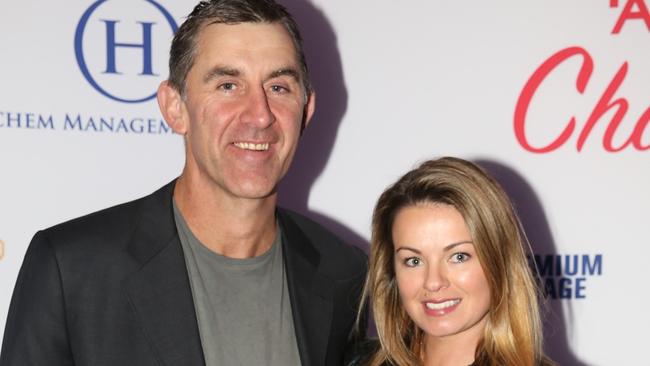
HM: Why?
CM: It doesn’t seem to make much sense now, but I was 23 years old, and to the outside world, a young man with everything, the world at my feet. But I didn’t feel like that at all. I was as low as I’d ever been. I remember sitting on the couch in Port Melbourne with a stress fracture in my foot, just wondering, “What am I doing here? Why am I in such a dark place? I don’t like anything I have and who I am”.
HM: What had got you there?
CM: I allowed the media scrutiny really get to me. At that time at North Melbourne, we were having great success, but I was getting down on myself, letting all the media talk about who I was, and why my form was down, take hold of my thoughts. I started to believe that my poor form meant I was a poor human. And I was failing. And I thought that what people were saying about you really mattered. And I just spiralled out of control.
HM: How dark was the spot you were in? Did you ever think about doing anything crazy?
CM: I did. I obviously didn’t go through with it, but I was contemplating it
all. To get to that point proves that regardless of who you are, everyone can get themselves into a hole, but not all can get out of that hole.
HM: You were lucky.
CM: I was. I was lucky to have some people to talk to, and I did. From what I’ve learnt, you have to talk when you go into dark places. Taking it back to some of the things I’ve learnt from Wayne Schwass, the power of a conversation with someone is impossible to put a value on. It can take the weight of the world off anyone’s shoulders. In my case, I was trying to live up to expectations and not meeting them, and judging myself on the back of that as a failure. I was expecting myself to win the Brownlow — that was my standard — and I wasn’t meeting it. I was a failure. That’s how I was looking at it. If I’m not the AFL MVP and the Brownlow medallist with 29 possessions in the grand final, I’m a failure.
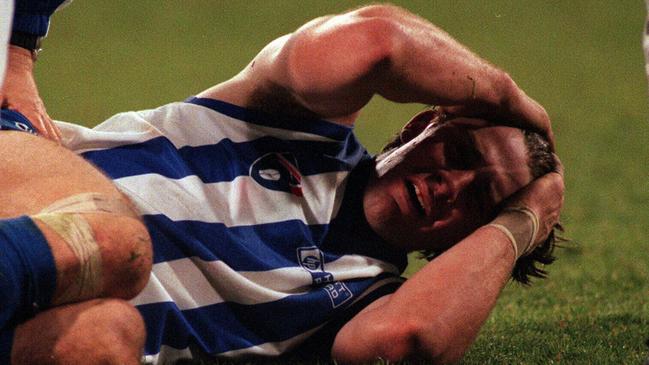
HM: You weren’t meeting yours or other people’s standards, and as a result, lowered the view of yourself to the point where you thought, “I’m best ending this whole thing to put myself out of my misery”.
CM: One hundred per cent. And Hame, this is pre-social media. I couldn’t play in the environment that exists now. It is a horrible online world filled with criticism and hatefulness.
HM: This was mainstream, before all the acidity of the outer world came to be.
CM: I can’t believe some of the things that are written about players — mainstream and on social. Below this article there will be hate-filled comments — it happens all the time. It has become normalised. I can’t believe the papers allow the comments to be seen. People hide behind the line: “The players get paid a lot of money!”. What does that have to do with anything? They are humans, with families and feelings. Money doesn’t make you immune from depression and anxiety and feeling low.
HM: You are incredibly passionate about helping people from your learnings and seemingly have found yourself in a great spot now?
CM: I’m doing anything I can to help people now, because I know what they are feeling and where they are at.
HM: What are you doing?
CM: Where I can, I am explaining my story and what I went through at that time, and how I was affected by the media scrutiny and the pressure to perform. Let people know it’s not abnormal to feel the pressure. For me, it really came back to: what are the things I’m super passionate about? Helping others. There are a number of different things, but when I first saw what was happening with the pandemic, in the early days, one of the headlines was that the suicide toll was going to outnumber the death toll from coronavirus. Sadly, that’s happening. I know there are a lot of deaths that are happening due to coronavirus, but no one wants to talk about the suicide toll. I’ve seen Wayne Schwass, I’ve seen Jake Edwards and the great jobs that they do in their respective callings, and I thought, what can do to help?
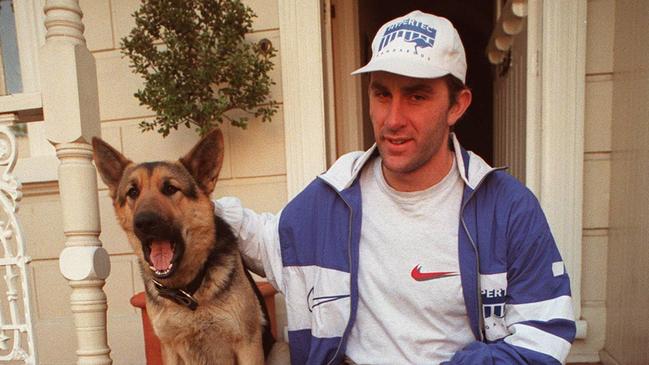
HM: And it was around getting people talking?
CM: I’m not an expert in mental health, I’m never going to profess that it’s my field, but the project I am really engaged with and see people really benefiting from is something I call Walk With Me. I thought I’d start a zoom call where people can log in on a Monday, Wednesday or Friday, from 7am in the morning, and if they’re either struggling or want to get some tips, I’ll have a chat to them, and get their day off to a great start as we all just walk together. The whole purpose behind it is: how can I give them more tools in their kit bag that will allow them to come out the other side thriving? Sometimes a conversation can be hard in the space we’re talking about, but what’s easy is to say, “Mate, let’s go for a walk”. That’s how this whole thing started. I take people for a walk, talk about the habits I learnt in football, meditation and how to avoid sinking deeper into the hole. Sometimes I am just doing a lot of listening to people who want to talk. The more tools I can help put in people’s kit bag, the better they can be when the pressure is on.
HM: How many people have you had on the walks?
CM: We have a couple hundred members, and that’s growing all the time. Every session, anywhere from 25 to 35 dial in at 7am and are fully engaged. It’s become a great little community. People are getting on board, and I thoroughly enjoy it. If I sense that the mood is down, I feel like I’m the coach talking to my team at halftime. We’re down by 20 goals, we’ve lost our two best players, and I’m trying to come up with ways to get everyone going again! Particularly with the second lockdown, I’ve had to try and find ways to get everyone up and about again. I love it, and I sense that it’s making a difference. It’s unbelievably rewarding.
HM: It sounds like it — I can hear it in your voice.
CM: I love it. I’ve also teamed up with Jason Bennett to relaunch the TV series Aussies Abroad, which is a weekly vodcast/podcast supporting and connecting Aussies around the globe with their inspiring stories from sport, business and entertainment. I’m learning a lot from them, and through the Fork In the Road interviews I’m doing … which you’re going to be a guest on in the next couple of weeks …
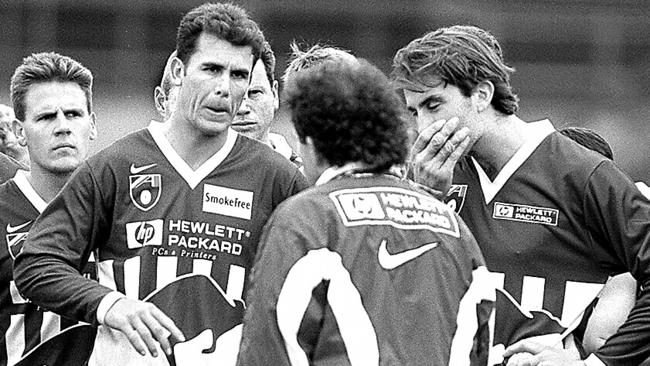
HM: … no problem …
CM: … I just ask people about the moment that their life could have gone either way. It’s amazing how often people have a really significant “fork moment”. I’ve had everyone from Eddie McGuire, John Daly, Wayne Carey, Glenn Archer, Bianca Chatfield. Brendan Fevola is this week. Everyone likes a comeback story or to be shown that you can climb to the top of the mountain, even if you fall a few times.
HM: There’s not many of us that don’t need a second chance at some point! It sounds like you’re the happiest you’ve been for a long time.
CM: I’ve managed to find my purpose, and my “why”, Hame. I wasn’t happy for a number of years with the things that I was doing and the way I was behaving. I’m proud of the work Wayne Carey has done on himself, and I had to do the same thing. You’ve actually got to find what you really believe in, what you really stand for, and what you are passionate about. I know what I want to do moving forward, and the things I’m not going to put up with moving forward. I heard Navy Lieutenant Commander Liz Quinn speak recently and she said, “Don’t waste a good crisis”. We are all in one now. Let’s learn from it and come out stronger.
HM: Let’s hope.
CM: It makes you realise, I can do one of two things. I can sit here and complain about it, or I can find a way to make it work. I met Gary Player on the practice fairway of Augusta National, and he said to me, “The one thing I have learnt is you’ve just got to find a way. Whatever you need to do, you’ve got to find a way”.
HM: I haven’t heard you sound so good for a long time. It’s really great.
CM: I’m still a work in progress.
HM: We all are!
CM: Thanks, mate.
READ MORE:
THE PHONE CALL THAT CHANGED BT’S LIFE FOREVER
